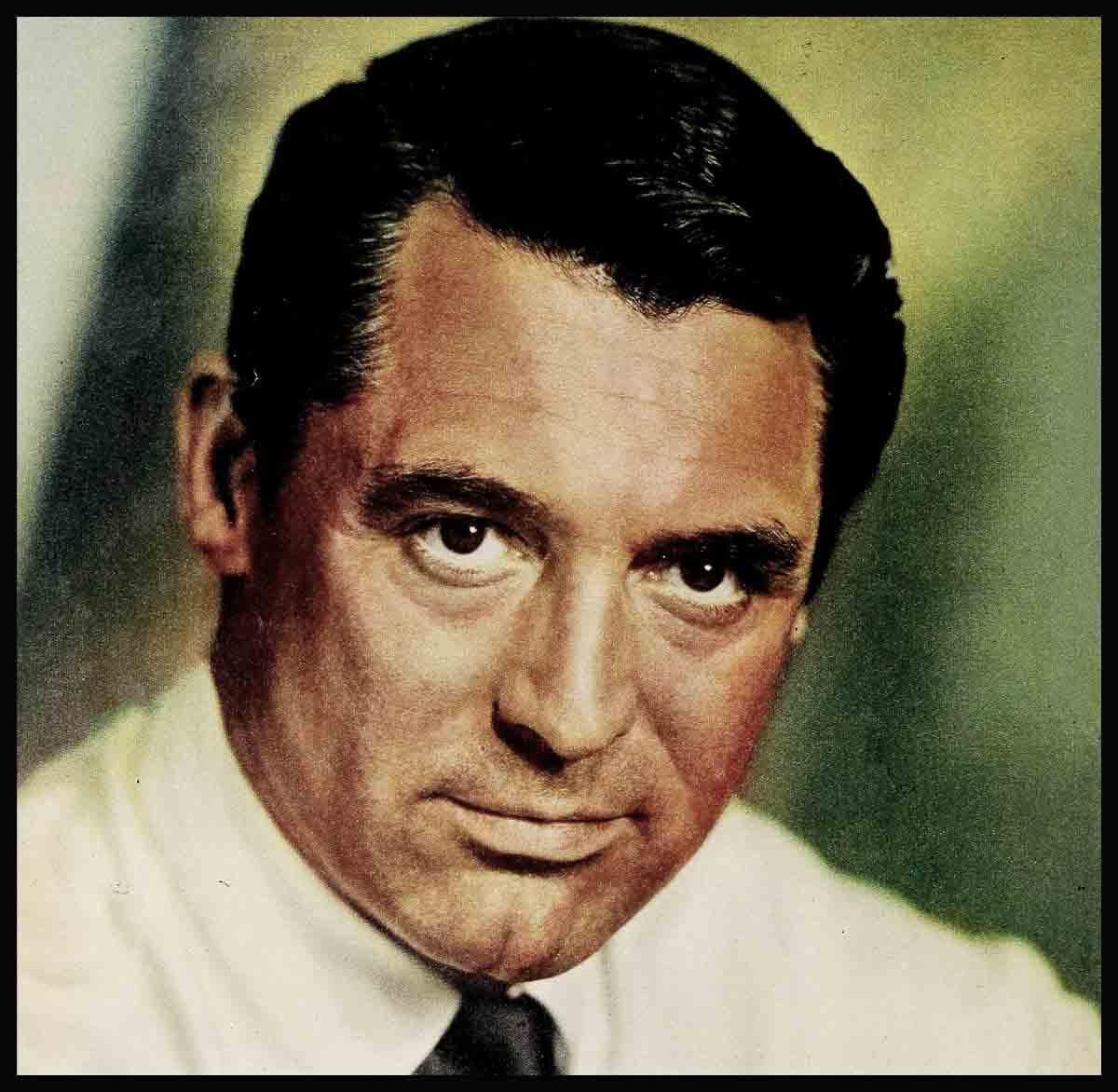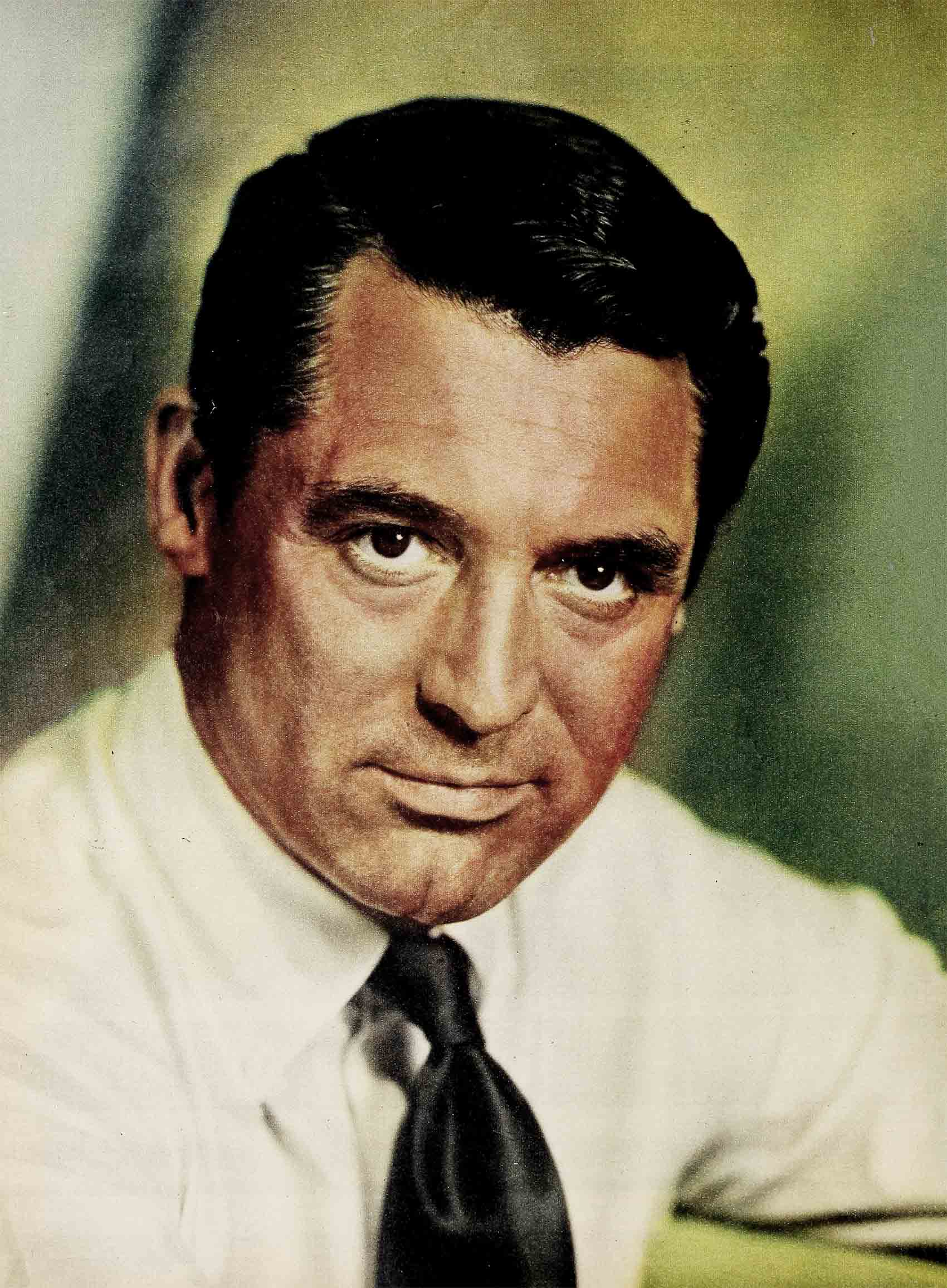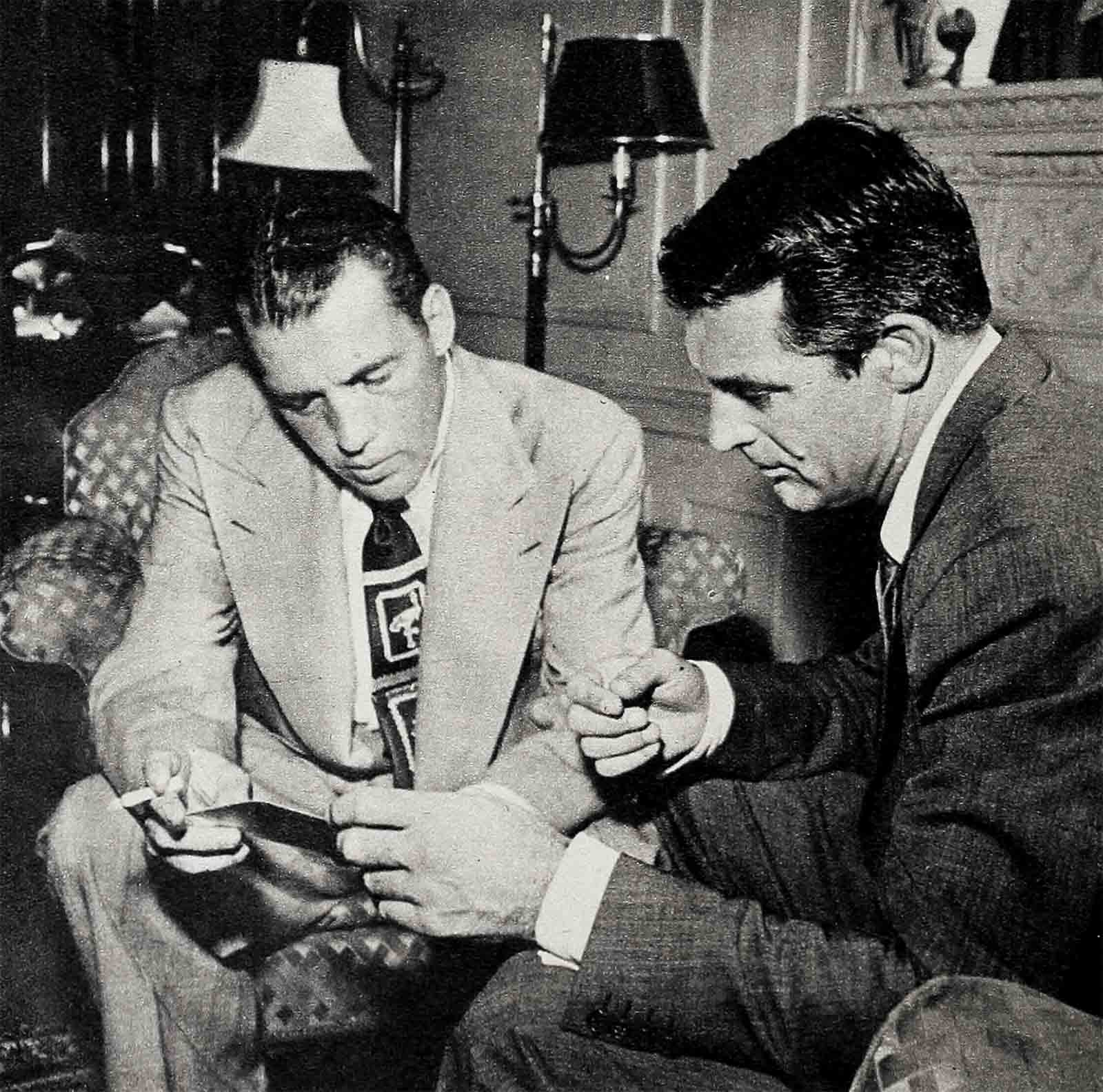
Their Finest Hour—Cary Grant
The big, lean guy with the Tom Collins lolled back in a chair. In deference to the sweltering heat that panted up from the streets below his Sherry-Netherlands suite, he wore nothing but a bath towel around his body, and thus attired, he was quoting from the June 18th, 1940, speech of Winston Churchill:
“Let us therefore brace ourselves to our duty, and so bear ourselves that if the British Commonwealth and Empire last for a thousand years, men will say: ‘This was their finest hour.’ ”
The big, lean guy was Cary Grant, and he was saying that his trip to England had convinced him that, seven years after Churchill had called out to his countrymen to stand firm, the English still were living “their finest hour.” With food rations reduced, petrol allowances abolished and the program of austerity stepped up, Englishmen still were sweating it out, still taking it on the chin like thoroughbreds. “It’s amazing,” said Grant, “simply amazing. You’ve got to tip your hat—and your heart—to the pure courage of a nation that has suffered, but hasn’t whimpered.”
Grant remembered a conversation he had held with a taxicab driver. “How’s the Attlee government?” Cary’d asked him. “Not bad at all,” answered the cabbie. “Things are bad, of course, for all of us, but the school children get their books free, which wasn’t the case when I was a lad, and each day at school, the little ones get milk to build up their bodies.”
Grant leaned forward: “You see, Ed,” he told me, “the people derive great pleasure and consolation from little things and so they bear up under big things.”
Long ago, Alfred, Lord Tennyson, told of the great courage of Britishers in poetry:
“Forward, the Light Brigade!
Was there a man dismay’d?
Not tho’ the soldier knew
Some one had blunder d.
Theirs not to make reply,
Theirs not to reason why,
Theirs but to do and die:
Into the valley of Death
Rode the six hundred.”

“That’s it,” said Cary Grant. “England is again living up to its great traditions. You just blink your eyes at the stoic bravery and endurance of the man in the street. He stands in line patiently, and with a minimum of griping; he knows that if the government imposes tighter controls it’s because of a great crisis, and at night, when he is able, he takes his family to the theater and laughs at Sid Fields or some other English comic. People are hopeful that American movies won’t be barred, but they understand, too, that. by cutting down imports, England will save about $837,000,000 in one year.”
Had black markets sprung up? I asked.
“The government has stamped them out relentlessly,” Grant said. “That’s one reason that the nation is pulling together. They know that nobody is profiteering, that what-goes for one goes for all. There may be one or two spots that traffic in food, and there may be a very little blackmarket gas. Britain is an industrial nation, and the people get a tremendous lift from their weekly bicycle or motor excursions into the countryside. They could be pardoned if they got themselves five extra gallons of petrol for their weekend jaunts, because that’s one of the few real pleasures left to them. Yet, even in this, you are startled at the scrupulous honesty.”

Grant said the weather this summer had been phenomenally fine. “In England, when I was a kid, the whole countryside around Bristol was excited when the sun came out. This past summer, the sun shone almost every day. It was a great thing, particularly after the frightful winter, one of the worst in history. You could see the grown-ups and the children just soaking up the warmth.”
While Grant was in England, there was a delegation of American fact-finders touring the country. They found that British rations today are tighter than they were before the war, and that England, plagued by a dollar crisis and lack of money to pay for imports, faces its worst winter food problem in nine years. Britons, the U. S. fact-finders reported, live on a dull diet that supplies about 2,800 calories a day, and this winter, there will be less canned meat and fish, less dried fruits and less citrus.
The American investigators had a typical London meal: a roll with no butter, veal pie with very little veal, potatoes and spinach, coffee and fig pudding.
Extra meat rations are allowed to miners, and critics of the Labor Government have used this against Atlee, pointing out that occasionally miners get this extra allowance, even when they are not at work. By and large, however, despite the fact that the low calory content leaves the populace without pep and energy, there is very little irritability.
“You can understand now, in this new crisis, why Englishmen gravitated to the poetry of Rudyard Kipling,” Cary Grant pointed out. “Kipling might have been thinking of today when he wrote:
“If you can force your heart and nerve and sinew
To serve your turn long after they are gone,
And so hold on when there’s nothing in you,
Except the Will which says to them: “Hold on!”
“That’s what’s taking place in England, right now, Ed,” Grant continued. “They’re holding on, just on courage.”

gentlemen prefer blondes . . .
I asked him what had been a standout. impression of his trip. “Elizabeth Taylor,” he said. “That stunning little 15-year-old is going to be one of the great glamor girls of the movies, mark my words. Personally, I’ve always preferred blondes, but this little brunette with blue eyes had everyone on the Queen Elizabeth turning his head for a second look. Unfortunately, she was taken ill the second day out, so the ship lost some of its decoration.”
Had the autograph fans lived up to their reputation?
“Good Lord, yes,” he exploded. “If you stay in your cabin, they come rapping at the door. If you go on deck, they almost push you overboard. Frankly, I don’t. understand why people want the autograph of somebody who doesn’t know them. In London, the professional autograph hunters are just as rude as in our country. It seems to be an international infection. Being a movie star has its drawbacks, just as being a goldfish in a bowl must have its unhappy points.”
The purpose of Cary’s trip to London was to set up a production partnership deal with Alex Korda.
“Our first picture will be filmed at Monte Carlo,” he told me, “so if you want to play a little roulette, Edward, come along with us.”
I told him I couldn’t make it, but to bet fifty francs for me on Number 29. He said he would, so we shall see what we shall see.
At that point, the photographer suggested that Grant get dressed for the pictures that illustrate this piece. That’s why you don’t see him with a bath towel around his middle.
While he dressed, I asked him how went the drama in London. “Dolores Gray, in Annie Get Your Gun is the toast of the city,” he said. “Noel Coward and I had seen the show in New York, with Ethel Merman, so we were anxious to catch Dolores in it. She plays it entirely differently from Ethel, and yet scores just as big. London really has gone for Dolores in a huge way. Don’t be at all surprised if British movies make a star of her.”
He came out of the bedroom, apologizing for his sweat-stained shirt. “That’s all right,” said the photographer. “Just put your coat on.”
Grant did so, and looked at the photographer in surprise. “Now why didn’t I think of that?” he asked. “Don’t tell me.”
THE END
—BY ED SULLIVAN
It is a quote. MODERN SCREEN MAGAZINE DECEMBER 1947




